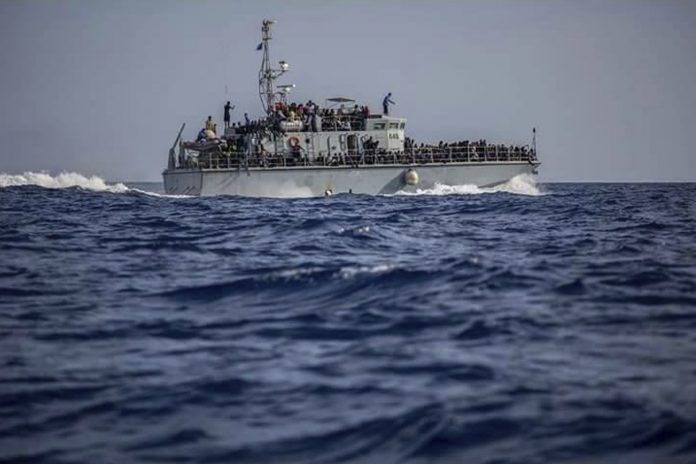
European Union officials are seeking support from member states to have naval ships enforce the U.N. arms embargo against Libya, according to a confidential memo obtained Friday by The Associated Press.
The proposal from the EU’s diplomatic service, dated Feb. 12, suggests the bloc’s largely dormant anti-migrant smuggling mission Operation Sophia should be renamed “Operation EU Active Surveillance.”
The memo, circulated ahead of a meeting Monday of EU foreign ministers on Libya, urges member states to agree on whether gathering information on, and upholding, the U.N. embargo should become the naval mission’s “core task.” Monitoring people smuggling would be relegated to a “supporting task” carried out from the air.
World powers agreed at a conference in Berlin last month to respect the arms embargo against Libya, but in practice weapons have continued to flow to the two warring factions.
The European External Action Service, the bloc’s diplomatic arm, warned in the memo that “we run the risk that, short of concrete action, the EU will become irrelevant and others will continue to determine the development of events in Libya in ways that will not respond to our interests.”
“In fact, blatant violations of the arms embargo continue and have even increased in the last weeks,” it added.
“In order to protect its interests, the EU has to act in a credible manner that produces changes on the ground and conveys a clear message of determination,” EU diplomats suggested.
The proposal goes beyond the agreement by EU countries last month to refocus the mission on the arms embargo by stressing the need to “deploy naval assets in the relevant zone of its Area of Operations.”
The EU naval mission Operation Sophia was launched in 2015 amid a wave of irregular migration from North Africa to Europe. It was named after a baby girl born to a rescued Somali woman aboard a German frigate.
But tension over how to distribute migrants picked up in the Mediterranean among EU member states, and claims that the naval presence might encourage smugglers, led Italy to block the deployment of further ships last year. It currently functions almost exclusively using aircraft and pilotless drones.
One European diplomat said there was agreement among the bloc’s 27 members to strengthen U.N. monitoring of the embargo, but not on the issue of dispatching naval assets.
The diplomat, who was not authorized to speak publicly, said Austria has objected to putting naval ships back into the Mediterranean, an issue that would likely come up at the annual Munich Security Conference over the weekend.
In an apparent concession to governments concerned about the naval ships picking up migrants, the EU memo proposes that “naval assets can be deployed in the areas most relevant to the implementation of the arms embargo.”
This would be “in the eastern part of the area of operation or at least 100km off the Libyan coast, where chances to conduct rescue operations are lower. Rules of engagement will have to be designed in a conflict sensitive manner,” it suggested.
Since the 2011 ouster and subsequent death of dictator Moammar Gadhafi, Libya has sunk further into chaos and turmoil. It is currently divided between a U.N.-supported government, based in the capital, Tripoli, headed by Prime Minister Fayez Sarraj and supported by an array of militias, and an administration based in the country’s east, supported by Gen. Khalifa Hifter.
Hifter and his self- styled Libyan Arab Armed Forces have been waging an offensive to capture Tripoli since last April. On Thursday, Hifter’s forces indiscriminately shelled residential neighborhoods around Tripoli, killing one woman and wounding at least four civilians.
Brig. Gen. Khaled al-Mahjoub, head of mobilization for Hifter’s forces, hailed the proposal as “an important step that would stop the influx of mercenaries and arms from Turkey to the criminal gangs of Tripoli.” He renewed calls for the arms embargo to be lifted on Hifter’s troops so they can carry on their offensive against “terrorist groups” allied with the Tripoli government.
The Tripoli-based government did not immediately respond to requests for comment.
The renewed clashes came just hours after the United Nations Security Council endorsed a 55-point road map for ending the war that demanded foreign backers of Libya’s warring sides uphold a widely flouted arms embargo.
Turkey, Italy and Qatar back the Tripoli administration while the United Arab Emirates and Egypt, as well as France and Russia, back Hifter’s side in the conflict.
Andrej Hunko, the European affairs policy spokesman for Germany’s opposition Left party, said the EU’s proposal to dispatch military ships risked “pouring oil into the fire” and wouldn’t stop weapons being smuggled into Libya by land.
Hunko called for a civilian operation to oversee the arms embargo. This could be carried out by the Vienna-based Organization for Security and Cooperation in Europe, of which Turkey — one of the main military backers of Sarraj — is also a member, he said.
___



















